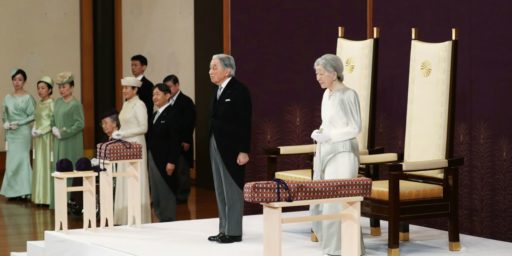A Republic, not a Constitutional Monarchy
Barbados provides an illustration of a frequently misunderstood concept.

Via the BBC: Barbados becomes a republic and parts ways with the Queen.
Barbados has officially removed Queen Elizabeth II as its head of state and become the world’s newest republic.
In an overnight ceremony in the capital, Bridgetown, Dame Sandra Mason was sworn in as president.
[…]
Dame Sandra Mason, 72, the island’s governor-general since 2018, was named as president-elect of the nation following a vote in parliament last month. She now replaces the Queen as the head of state.
“Vessel Republic Barbados has set sail on her maiden voyage. May she weather all storms and land our country and citizens safely on the horizons and shores which are ahead of us,” she said after being sworn in.
Barbados announced its plan to become a republic last year, but it will remain within the Commonwealth.
Barbados remains a parliamentary democracy with a Prime Minister as head of government. Like other republics with parliamentary systems, the president is now head of state. Presidents in those contexts have largely ceremonial roles (other examples of this include places like Germany and Israel–places whose presidents I suspect most readers are unfamiliar).
As I have noted before, being a “republic” simply means that sovereign power derives from the people directly while in a monarchy sovereign power resides in the queen (or king, emperor, etc.). Places like Japan (whose head of state is Emperor Naruhito) or Spain (whose head of state is King Felipe VI) are democracies, but not republics (both are parliamentary, with PM’s as head of government). Likewise, Canada is a constitutional monarchy, as Queen Elizabeth the II is their head of state. Israel is a republic and a parliamentary democracy, with its head of government being Prime Minister Naftali Bennett, but its head of state is President Isaac Herzog. A major hallmark of presidentialism is that the president is both head of state and head of government, which is the case in the US and in other presidential systems like Mexico and Colombia.
So, Barbados is now, like the United States, both a republic and a democracy. I would note that Barbadian democracy lacks things like federalism, the representational structure of the Senate, and the minority-favoring Electoral College–all things that many Americans associate with “a republic, not a democracy” when speaking about the United States’ constitutional order.






I’m pretty sure you’re missing the point of the “republic, not a democracy” spiel.
It is meant to convey (I’m quite certain) that the Constitution only guarantees a republican form of government, not necessarily a democratic one.
“Republic” (or res publica in Latin) means that the state is held in common by “the People” in the abstract (as opposed to a single monarch), not necessarily by all the actual adult individuals that make up said people.
The notion that political power in a Republic does not extent equally to all citizens has been the norm from the invention of the term by the Romans to the early twentieth century.
As you undoubtedly know, in the early US quite a few states (most, I think) allowed only white male adult property owners to vote. Many adult male citizens were excluded. This changed only in the early 19th century – but even then not fully.
“We are a republic, not a democracy” doesn’t mean that republics as such cannot be democratic, rather it refers to the idea that the US in particular needn’t be democratic. “Not the Founders’ intention,” etc.
So. We seem to have gone from “The Arsenal of Democracy” to “A Republic Not a Democracy” in the space of 80 years.
This is the test all democracies will sometimes face, I think. What do her people do when the majority wants something that others detest. Do they defer and say, “The people have spoken” or do they say, “By any means necessary” or perhaps “They cheated!”?
@drj: I understand it all quite well, I would argue. If we are going to go to the founding, Madison site clearly saw a “republic” as a representative system (what we call democracy). Ironically, Madison is a major source of the democracy/republic conversation. I have written on this extensively. (just google “a republic, not a democracy library.”
But I also think that most people who use the formulation in question don’t, even in the way you are describing it.
Most people who use it are trying to justify the lack of representation in institutions like the Senate.
@Steven L. Taylor:
Yes, but representation is not necessarily the same as equal representation. Not even for Madison – at least not explictly so in Federalist No. 10.
We tend to understand “representative form of government” as a system in which all citizens are represented equally. But historically this is not the case at all.
To give but one example: votes of wealthy Roman citizens counted for more than the votes of poorer Roman citizens – even though all (male) citizens had the vote. It’s just that not all votes had equal weight.
(The Roman Republic was, of course, a major example to the Founders.)
This is exactly my point!
What these people are saying is that the votes of people in rural states should have more weight, because these votes also represent, besides people, territory. And because small land areas (cities) should not be overrepresented, rural votes should count for more.
But what about democracy?
“Well,” they say, “the Founders only specified that there should be a representative, republican form of government. There is nothing in the Constiution about equal representation of individual citizens.”
And that is, IMO, what is meant by “republic, not a democracy.” That it is perfectly fine, as well as fully in line with applicable Constitutional norms that some votes carry more weight than certain other votes.
@drj:
I recommend watching this video about the Alabama Paradox. It goes into some detail about just how difficult it is to have “equal representation” in the House. And just how Congress has changed the math over the centuries in order to figure out the best way to do it.
With regards to the Senate: the difference between a “small” state and a “large” state wasn’t very much at the time the deal was shaped. Chicago–just within the city limits–has a population larger than the entire country in 1776. The difference between the largest and smallest states was a mere 688,516. The difference between our largest city and our smallest state is 8,227,339–in favor of the city.
It was a reasonable compromise at the time, but not built to scale.
Personally: I’d like to see the House be more mathematically equal (understanding that there are some quirks you can’t get past–such as the afore-mentioned Alabama Paradox). I’m not sure what could be done with the senate–other than perhaps reducing their authority.
I don’t want rural states to have more voice, but I also don’t want their voices drowned out. Note: This is not about parties, it’s about populations; more and more rural states are drifting towards purple, if not verging on blue.
@Mu Yixiao:
?????????
Well, NH and Maine in a good year for Dems, and Vermont. But name other “rural” states that are trending purple.
@Sleeping Dog:
Results by county 2020.
I’m seeing Arizona, New Mexico, North Carolina, South Carolina, Mississippi, Colorado, Wisconsin, Minnessota, and Iowa. Montana’s starting to turn, and South Dakota is fading to light pink with a fair amount of blue showing up.
Remember: When talking about Senate seats and the White House, it’s total population of the state. So a couple big cities in somewhere like South Dakota will determine the color of the state. 21% of the state’s population lives in one city.
If I felt like taking the time, I’m betting that those 9 blue counties on the map make up at least 50% of the state’s population. So while the vast stretches of empty land may be red (or pink), the population is probably closer to purple.
@drj:
It’s a bit complicated. Not all wealthy Romans were Patricians, and not all Plebeians were poor. Italians, before they were granted Roman citizenship, had a devalued vote as compared to their population numbers, regardless of wealth. Rich or poor, all Italians represented one tribe, think of it as one EC vote for all of them.
It gets more complex as there were different assemblies which could vote on laws, and there was no legislative body. The popular assembly excluded Patricians, but not the wealthy.
And of course there was the matter of whom could afford or manage to travel to Rome to vote for a law. You’d think the poor in surrounding villages might not be able to, but the poor inside the city were.
I’m sorry. Did I say “it’s a bit complicated”? Clearly I was wrong.
@Mu Yixiao:
First of all, the prior paragraph to the one mentioning rural states trending purpleish only discussed the House, the reference to the Senate was to accurately point out that at the time of the Constitution’s writing the difference in the size of states was small, in comparison to today.
With regards to the states you mentioned. NM and CO have been blueish for better than a decade, Minnesota since FDR, but is becoming more competitive. I won’t debate you about WI, as you live there. SD and Iowa? Montana? The popular retiring, Dem governor, was crushed in the last senate race. I wouldn’t count AZ as a rural state, since most of the population is within 3 metro areas.
It’s not uncommon for many people to use terms inaccurately, especially compared to academic use.
I think if one digs deeper into the “republic, not a democracy” view that’s commonly expressed, you’ll find that “republic” is standing in for things like federalism and separation of powers. Using “republic” in that way is not an accurate use of the term, but I think that is what most people mean when they use that phrase.
@Mu Yixiao:
The differences in absolute numbers are not important, it is the ratio.
Using census data, one can compare the total population of the least populous to the most populous state every ten years. The current ratio is not a historical aberration – California has 68.5 time more population than Wyoming in the 2020 census. In the 1960 census, New York had 74.2 times more population than Alaska. In 1870 New York was 102 times more populous than Nevada. Here are the ratios since 1960, the first census once we had the 50 states we do today:
1960: 74.2
1970: 66.4
1980: 58.9
1990: 65.6
2000:68.6
2010: 66.1
2020: 68.5
So the whole notion that the representativeness today resulting from a comparison of CA and WY is a historical aberration is simply not true. We’ve had these huge disparities though the entire history of the country.
The rise in absolute numbers is a problem because the size of the House hasn’t increased in a century, and therefore each representative now represents more people which is arguably less representative.
@Andy:
And it’s not uncommon for people who know what a term means to want it used correctly. 😉
@Andy:
Right, but “we are a government structured on federalism and separation of powers, not a democracy” is still flimflam. No matter how incorrect they are semantically, they are also incorrect in pragmatically.
@Neil J Hudelson: Exactly.
The main point of most people who say “a republic, not a democracy” is a desire to justify some citizens having more power than other citizens (with the veneer of some intellectual protection for the view).
@Steven L. Taylor:
I’m not a mind-reading so don’t know the intentions of people using that phrase. But I think it’s strange to argue on one hand that people are ignorant of the term, and then turn around and argue that people are using the term in an intentionally deceptive way, which would suggest they aren’t ignorant of the term, they are just dishonest.
Just based on my own experience, that is not the motivation.
Every modern democracy has anti-democratic features and in every system there are people who have more effective power than others. And the basis of politics is groups of people banding together to promote their own views and interests even if it’s first among equals. That’s just human nature sadly. The question, at least IMO, is about the degree of anti-democratic features necessary to maintain a civil society within a particular population and prevent all the very bad things that come from too much democracy. I think it’s pretty clear that you desire to move our present system and its institutions more toward the democratic end which is fine and some of your goals, at least, are things I also support in a general sense.
But those who like the status quo can have many other reasons for supporting the status quo besides some desire to justify having more power over their fellow citizens.
@Andy: I agree that it is impossible to know what every single person who says something means by it. Am I am over-generalizing? Sure.
But by the same token, this seems like a weird thing to argue over.
Do some people simply misunderstand the terms? Yes.
Do some people understand the terms and misrepresent them? Seems possible and almost certainly happens.
More likely than not, people both don’t fully understand the terms, but are trying to make them mean what they want them to mean.
How about this: I think a lot (goodness knows it is impossible to account for everyone with this type of statement) of people who use that phrase are looking for a way to justify unequal distributions of power among citizens that they benefit from. This is not, in my view, a good thing regardless of their level of understanding of the terms in question.
I am sure a lot of them think they are making a solid philosophical point. I think that they are incorrect in a variety of ways.
@Andy:
Let me address this directly. Yes, of course.
But some are central to actual democratic functioning, i.e., basic rights should not be subject to a majority vote, especially when protecting minority rights.
But making my vote count more than yours because of where I live is rather hard to justify from a democratic point of view.
Lok at the discussion… splitting hairs, discussing intent, analogies…. blah, blah, blah.
Nero fiddles while Rome burns.
None of this crap matters, because people have realized that they can line their pockets and future with political donations. The means now is the way, completely justified by greed, and replaces the end-goal entirely.
The fascists are winning. Who cares what is meant by republic.
@Steven L. Taylor:
And that’s a valid opinion. But of course, the United States has endured as a democracy with that condition for longer than any other since at least the Roman Republic. The fact is that most Americans do not seem much bothered by that condition, much less bothered enough to engage in the difficult and risky effort to amend the Constitution.
@liberal capitalist:
And your comment is different how?
Commenting on blogs is inherently blah, blah, blah. It does nothing to put out any fires or solve any problem. Those who think the end of democracy is nigh, or that fascism is on the doorstep aren’t actually doing anything useful by commenting on blogs, or even doing anything online generally.
@liberal capitalist:
I can’t speak for anyone else, but personally I can read an interesting article, discuss semantics, and also work hard to protect democracy.
Judging by the fact that you are commenting on this post–and I assume are also working hard to protect democracy, or else why are you complaining about Nero fiddling?–it appears you can also do both.
ETA: Oops, refreshed and saw Andy had already said the same thing.